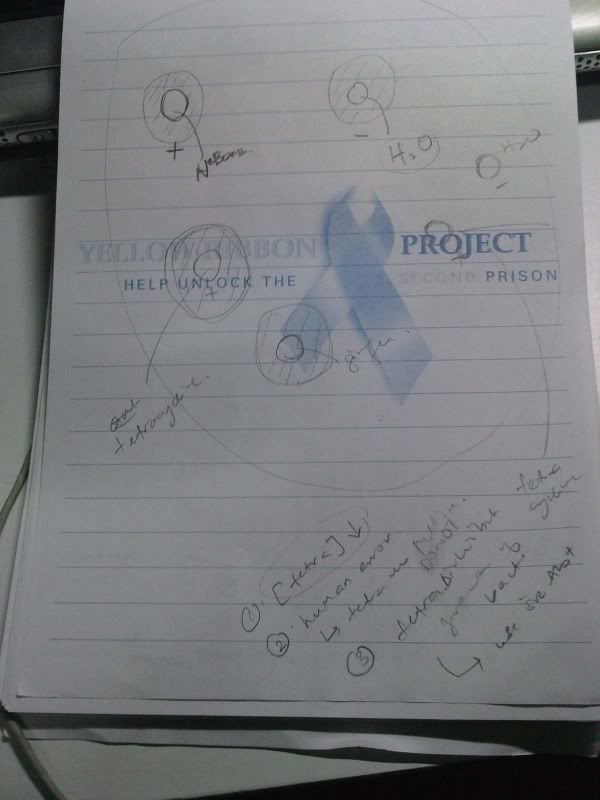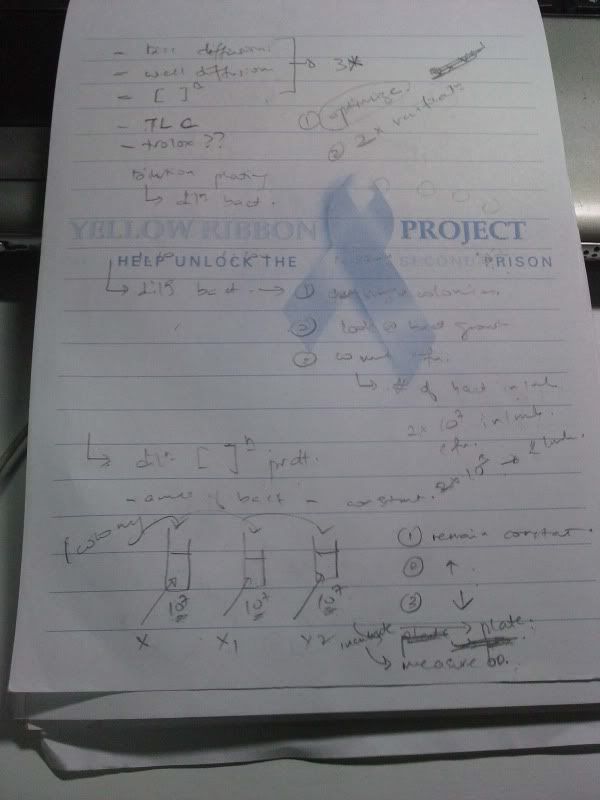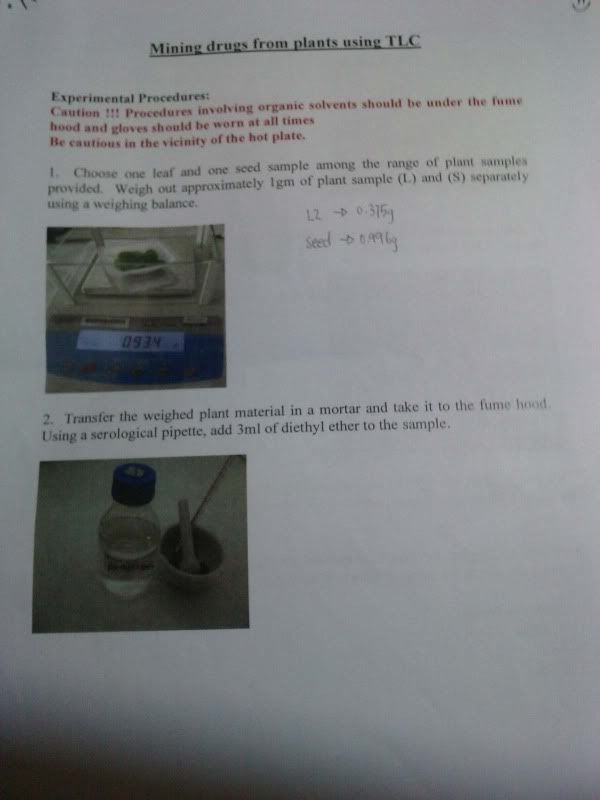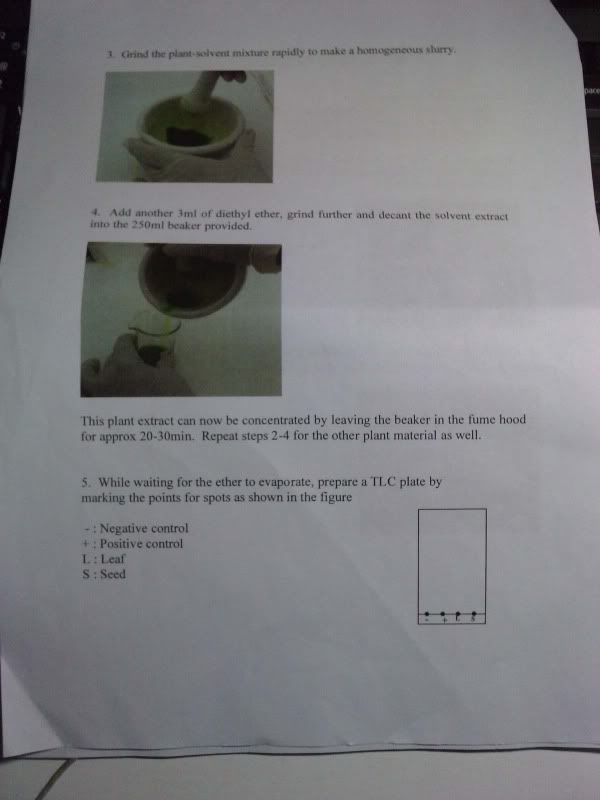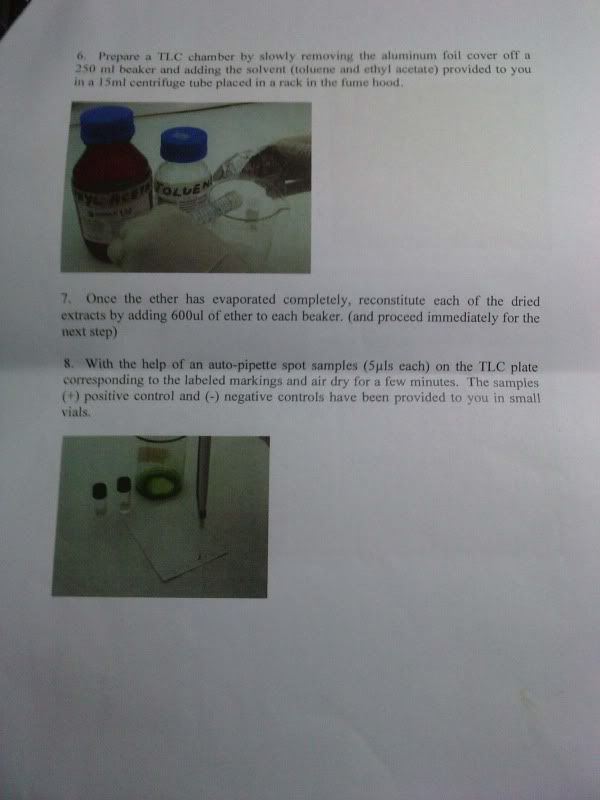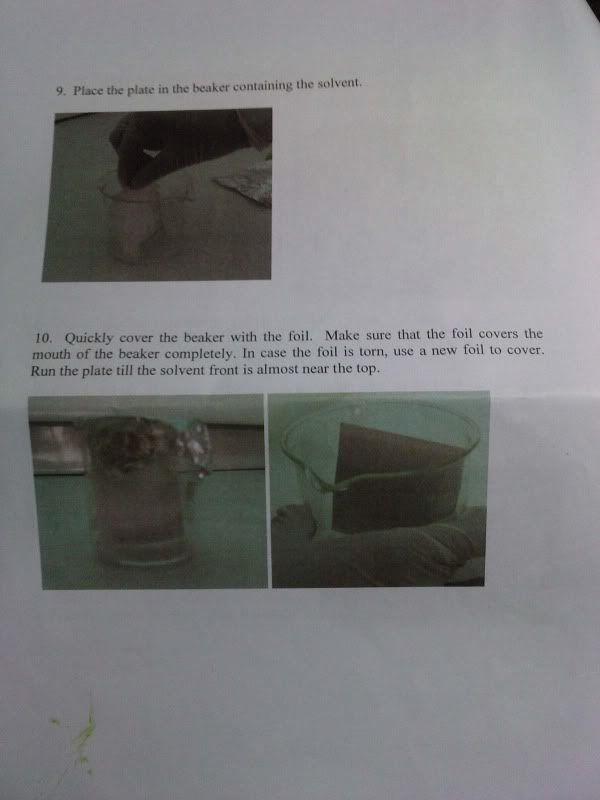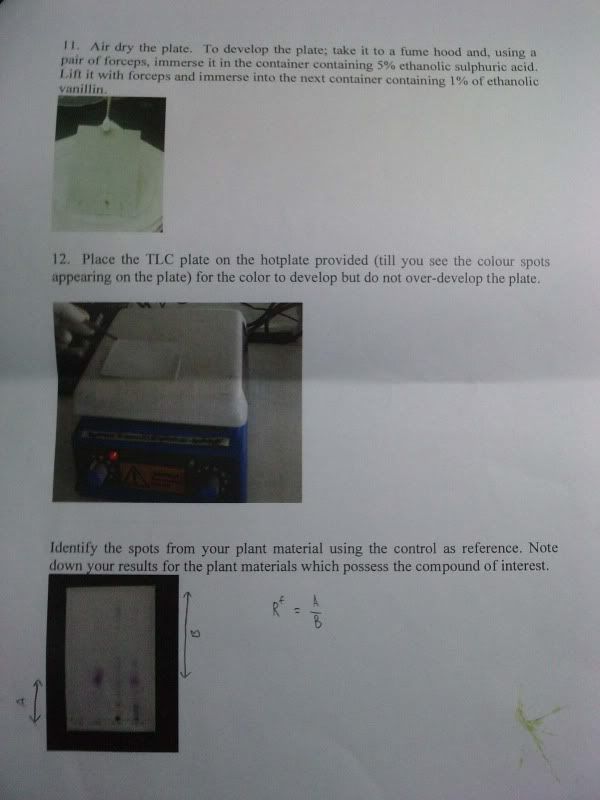Time: 10.30am - 12pm
Extraction of ginger
Things needed:
- knife (PY)
- 700g of ginger (PY)
- cloth; coffee cloth (Arfa)
- 90% ethanol 200ml (Arfa request)
- hot water (temperature-80 degree celcius)
Innoculation
- innoculate from one colony from the streak plate.
- one colony into 10ml of broth using innoculationg loop.
- put into incubator shaker 37 degree celcius, 100RPM.
- incubation time: 4pm(mon) - 9.30(tues) [17.5 hrs]
Rules and regulation
1. This project officially ended on 12 December 2009.
2. If you posted anything or edited anything, please credit yourself as the author.
3. Please just favorite this blog for teammates.
4.Do not link in blog to keep in confidential to other FYP team. (Now you have the right to link it to your blog. :)
5. For outsiders visiting this blog, please do not copy any of our contents or photographs without all our teammates permission. Offenders will be reported.
6. Lastly, please practice PROFESSIONALISM.
7. To copy logbook:
meeting 1 - 13 august
2. If you posted anything or edited anything, please credit yourself as the author.
3. Please just favorite this blog for teammates.
4.
5. For outsiders visiting this blog, please do not copy any of our contents or photographs without all our teammates permission. Offenders will be reported.
6. Lastly, please practice PROFESSIONALISM.
7. To copy logbook:
meeting 1 - 13 august
Let's just talk talk~
Monday, August 31, 2009
Saturday, August 29, 2009
meeting 5 - 27 august
Time: 1pm - 2.30pm
- Check OD
Innoculation time: 2.40pm (wed) - 1.20pm (thurs) (23 hrs +/-)
Control: 0
E.coli: 2.0563
- Streak plate
Using the broth that was innoculated yesterday.
Dip in a innoculating loop and streak plate.
For how to streak plate, go research yourself.
Put in incubator at 37 degree celsius.
Incubation time: 1.48pm (thurs) - 9.54am (fri) (20 hrs +/-)
- Result
Arfa said that the streak plate was too confluent and isolated colonies were too small.
As for the control, yet to get an answer from him yet.
Somemore help to ask and update here.
Thanks. :D
- Check OD
Innoculation time: 2.40pm (wed) - 1.20pm (thurs) (23 hrs +/-)
Control: 0
E.coli: 2.0563
- Streak plate
Using the broth that was innoculated yesterday.
Dip in a innoculating loop and streak plate.
For how to streak plate, go research yourself.
Put in incubator at 37 degree celsius.
Incubation time: 1.48pm (thurs) - 9.54am (fri) (20 hrs +/-)
- Result
Arfa said that the streak plate was too confluent and isolated colonies were too small.
As for the control, yet to get an answer from him yet.
Somemore help to ask and update here.
Thanks. :D
Thursday, August 27, 2009
updates about muslin cloth
Hello people!
I've found something about Muslin Cloth!! We can order in online if we really really want it. But I think it's just a plain cloth though. I want to post the picture of itbut I guess blogger is giving problems (as usual). So I guess you all have to take a look at it yourself. Simply just click the link below. That will do the trick. It will just take 1 min. I promise.
Muslin Cloth: http://www.greenfibres.com/product/40/1808/muslin-cloth-large.html


Besides that, I guess I've found the answer to Aliza's Golden question to Why we need to sun dry for like 1 pathetic week?
Basically, If there is moisture, there is tendency to grow molds? I guess so. That's why we need to dry it and really SUN DRY it for 1 week. Oh! and 1 week is because a typical ginger need at least 1 week to reach a moisture content of 7.8% to 8.8%, which is the standard percentage for drying the ginger.
There is another part about storing the Ginger too. I hope you guys take a look at it. Again, I've print screen the website to post it herebut I just can't post pictures right now. (Blogger problems, again) So! do take note on part 2.2 Washing, "killing", drying and also 2.4 Storage in this website here.

http://www.fao.org/inpho/content/compend/text/ch27/ch27_02.htm
Alright! I'm done here. Doo take a look at those 2 websites especially the drying part.
THANK-YOU-OH-SO-MUCH~*
I've found something about Muslin Cloth!! We can order in online if we really really want it. But I think it's just a plain cloth though. I want to post the picture of it
Muslin Cloth: http://www.greenfibres.com/product/40/1808/muslin-cloth-large.html


Besides that, I guess I've found the answer to Aliza's Golden question to Why we need to sun dry for like 1 pathetic week?
Basically, If there is moisture, there is tendency to grow molds? I guess so. That's why we need to dry it and really SUN DRY it for 1 week. Oh! and 1 week is because a typical ginger need at least 1 week to reach a moisture content of 7.8% to 8.8%, which is the standard percentage for drying the ginger.
There is another part about storing the Ginger too. I hope you guys take a look at it. Again, I've print screen the website to post it here

http://www.fao.org/inpho/content/compend/text/ch27/ch27_02.htm
Alright! I'm done here. Doo take a look at those 2 websites especially the drying part.
THANK-YOU-OH-SO-MUCH~*
Wednesday, August 26, 2009
Meeting 4 - 26 Aug
PLEASE NOTE THAT NOT EVERYTHING WRITTEN HERE IS IN DETAILED. ADD IN YOUR OWN NOTES AND REASONING IN YOUR OWN LOG BOOK.
Time: 9.30am - 3.30pm
Objectives: Fill in yourself
- Making of agar plates
25g LB + 15g agar into 1000ml
- Broth
18.75g LB into 750ml
- Saline
2.25g NaCl into 250ml
- Sodium benzoate
7.5g powder into 15ml
Negative control changed to sterilized distilled water.
- Might have plan to remove Lemon grass (Not confirmed yet)
Thinking of replacing with Pandan leaves. (Not confirmed yet)
- Extraction of Ginger
Things needed:
Muslin cloth/ Cheese cloth
90% or 95% Ethanol
- Innoculation
Put 100 ul of e.coli in 10ml of broth in a conical flask and incubate it at 37 degree celcius at 100 RPM. (2.40pm)
- Next plan of action
26 Aug Wed - innoculation
Thurs - discuss further on extraction method
- check OD
- streak plate
- is there a need to innoculate (maintain consistency)
Fri - check OD
- discuss further on extraction method
Next week
Mon - take one colony from streak plate and innoculate
Tues - serial dilution
Wed - count CFU
Posted by: Pei Yi and Aina
Time: 9.30am - 3.30pm
Objectives: Fill in yourself
- Making of agar plates
25g LB + 15g agar into 1000ml
- Broth
18.75g LB into 750ml
- Saline
2.25g NaCl into 250ml
- Sodium benzoate
7.5g powder into 15ml
Negative control changed to sterilized distilled water.
- Might have plan to remove Lemon grass (Not confirmed yet)
Thinking of replacing with Pandan leaves. (Not confirmed yet)
- Extraction of Ginger
Things needed:
Muslin cloth/ Cheese cloth
90% or 95% Ethanol
- Innoculation
Put 100 ul of e.coli in 10ml of broth in a conical flask and incubate it at 37 degree celcius at 100 RPM. (2.40pm)
- Next plan of action
26 Aug Wed - innoculation
Thurs - discuss further on extraction method
- check OD
- streak plate
- is there a need to innoculate (maintain consistency)
Fri - check OD
- discuss further on extraction method
Next week
Mon - take one colony from streak plate and innoculate
Tues - serial dilution
Wed - count CFU
Posted by: Pei Yi and Aina
Wednesday, August 19, 2009
meeting 3 - 19 august
Tuesday, August 18, 2009
meeting 2 - 17 august 2009
Time: 4.15pm - 4.45pm
Anti-microbial test (well and disk diffusion method)
Culture medium:
- approximately doing 50 petri dishes and 750ml of broth
- LB 50g + agar 18.75g
- 50 petri dishes; 5 rows
Bacteria strain:
- E. coli
- Staphylococcus (subject to availability)
- Saline: 4.5g NaCl to make 500ml 0.9% saline (for serial dilutions to count bacteria CFU)
- Filter paper
- Straws
Instruments:
- Spectrophotometer
- Biology Safety Cabinet
- Incubator Shaker
Equipments:
- Spreaders
- Inoculating loops
- Forceps
- Conical flasks
- Spatula
- Glass bottles
- Measuring cylinders
- Falcon tubes
- Aluminum foils
- Markers for labeling
- Weighing machine and weighing boats
- Masking tape and autoclave tape
- Micropipettes
- Parafilm
Questions:
How to extract Ginger and lemon grass based on the journal you going to share tomorrow? Processor? Blender? Or using some chemicals to extract it. Please share this tomorrow so please find out to complete the material list too. Thank you.
Anti-microbial test (well and disk diffusion method)
Culture medium:
- approximately doing 50 petri dishes and 750ml of broth
- LB 50g + agar 18.75g
- 50 petri dishes; 5 rows
Bacteria strain:
- E. coli
- Staphylococcus (subject to availability)
- Saline: 4.5g NaCl to make 500ml 0.9% saline (for serial dilutions to count bacteria CFU)
- Filter paper
- Straws
Instruments:
- Spectrophotometer
- Biology Safety Cabinet
- Incubator Shaker
Equipments:
- Spreaders
- Inoculating loops
- Forceps
- Conical flasks
- Spatula
- Glass bottles
- Measuring cylinders
- Falcon tubes
- Aluminum foils
- Markers for labeling
- Weighing machine and weighing boats
- Masking tape and autoclave tape
- Micropipettes
- Parafilm
Questions:
How to extract Ginger and lemon grass based on the journal you going to share tomorrow? Processor? Blender? Or using some chemicals to extract it. Please share this tomorrow so please find out to complete the material list too. Thank you.
Saturday, August 15, 2009
Questioning and notes for you to ponder on.
1) For Antimicrobial testing, which test are we going to do???
Well diffusion and/or disk diffusion and/or dilutions method and/or embedding method?
*By the way, I have founded the name for the antimicrobial testing that we did in FYP 1. The method about dilution one. The method is call dilution plating.
So are we going to do all 4 methods or exclude some of them?
My suggestion was to include all 4 of them because the more tests we do, the more accurate the result is.
2) So we are not doing Garlic and cinnamon anymore?
3) For antimicrobial testing, are we going to test with extract of the raw material or use commercial ones?
If use extract of raw material, we need find protocols on how to extract it.
If use commercial ones, where to buy it and what kind to buy? Oil, capsules, powder, liquid, solid... ?
4) How many agar plate and broth solution do we need to make?
How many grams of LB and broth powder to make how many plates and how much broth?
How many plates do we actually need?
Link to Qn. 1.
If we were to do all 4 methods, dilution plating and embedding need a lot of plates and broths.
In this case, Saline have to be prepared too.
I am suggesting 40 plates and 1000ml of broth, will be discussing it on next meeting.
5) For TLC, we need to test what compound of interest for each plant?
We will be testing the active compounds of the plant that caused the antimicrobial effect of course. So we need go find journals about it.
After that we still need to ponder on how are we going to get the compound of interest to test with the compound of interest in the plant. Don't know what am I saying? I will tell you on next meeting. :S
6) Could you all please update what journals you had on hand?
Pei Yi - 4 journals
1. Antimicrobial Properties Of Extracts Of Allium cepa (Onions) And Zingiber officinale (Ginger) On Escherichia coli, Salmonella typhi And Bacillus subtilis
2. Ginger 1
3. Ginger 2
4. Dilution plating
Posted by: Pei Yi
Well diffusion and/or disk diffusion and/or dilutions method and/or embedding method?
*By the way, I have founded the name for the antimicrobial testing that we did in FYP 1. The method about dilution one. The method is call dilution plating.
So are we going to do all 4 methods or exclude some of them?
My suggestion was to include all 4 of them because the more tests we do, the more accurate the result is.
2) So we are not doing Garlic and cinnamon anymore?
3) For antimicrobial testing, are we going to test with extract of the raw material or use commercial ones?
If use extract of raw material, we need find protocols on how to extract it.
If use commercial ones, where to buy it and what kind to buy? Oil, capsules, powder, liquid, solid... ?
4) How many agar plate and broth solution do we need to make?
How many grams of LB and broth powder to make how many plates and how much broth?
How many plates do we actually need?
Link to Qn. 1.
If we were to do all 4 methods, dilution plating and embedding need a lot of plates and broths.
In this case, Saline have to be prepared too.
I am suggesting 40 plates and 1000ml of broth, will be discussing it on next meeting.
5) For TLC, we need to test what compound of interest for each plant?
We will be testing the active compounds of the plant that caused the antimicrobial effect of course. So we need go find journals about it.
After that we still need to ponder on how are we going to get the compound of interest to test with the compound of interest in the plant. Don't know what am I saying? I will tell you on next meeting. :S
6) Could you all please update what journals you had on hand?
Pei Yi - 4 journals
1. Antimicrobial Properties Of Extracts Of Allium cepa (Onions) And Zingiber officinale (Ginger) On Escherichia coli, Salmonella typhi And Bacillus subtilis
2. Ginger 1
3. Ginger 2
4. Dilution plating
Posted by: Pei Yi
meeting 1 - 13 august
Time: 4.15pm - 4.45pm
Incomplete as some things have to be further discussed and unforeseen circumstances may happen.
17th August (team members only)
Time: after school
Objective: discuss journal and protocol on AM and TLC
19th August (team with Aliza)
Time: after UT at 9.30am
Objective: discuss journal and protocol on AM and TLC
25th August (team with Aliza)
Time: afternoon before/ After UT at 5.30pm
Objective: do LB agar and broth solution, check for materials and throw the old ones
26th August (team with Aliza)
Time: 12pm
Objective: do pour plate, inoculate E.coli.
27th August morning
Time: morning
Objective: check OD of E.coli, spread E.coli, do the embedding of plants on the agar
Do AM first then TLC...
Am for Ginger and lemongrass is to be divided; 2-3 people work on 1 plant.
Incomplete as some things have to be further discussed and unforeseen circumstances may happen.
17th August (team members only)
Time: after school
Objective: discuss journal and protocol on AM and TLC
19th August (team with Aliza)
Time: after UT at 9.30am
Objective: discuss journal and protocol on AM and TLC
25th August (team with Aliza)
Time: afternoon before/ After UT at 5.30pm
Objective: do LB agar and broth solution, check for materials and throw the old ones
26th August (team with Aliza)
Time: 12pm
Objective: do pour plate, inoculate E.coli.
27th August morning
Time: morning
Objective: check OD of E.coli, spread E.coli, do the embedding of plants on the agar
Do AM first then TLC...
Am for Ginger and lemongrass is to be divided; 2-3 people work on 1 plant.
Subscribe to:
Comments (Atom)
